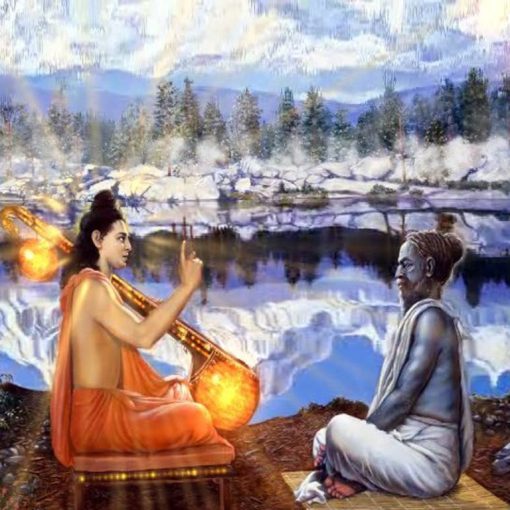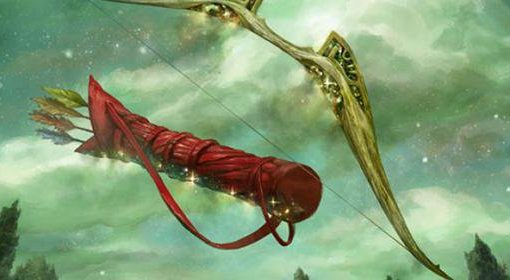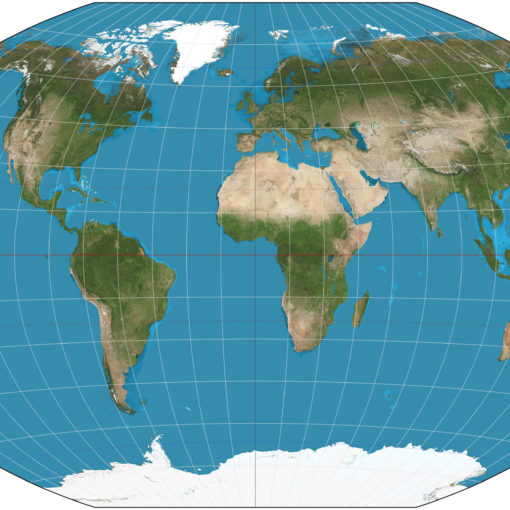After a few days Daśaratha left for Ayodhya, proceeding at the head of a large army. As the king, surrounded by his sons and the host of sages, was traveling along the broad road that led to Ayodhya, he suddenly saw a strange omen. Birds began to cry out fearfully and swoop low over their heads. Witnessing this foreboding sign, Daśaratha’s heart quivered and his mind became fearful. The king asked Vasiṣṭha if he knew the cause of those omens.
“These signs portend some grave danger,” replied the ṛṣi, “but here are groups of deer crossing our path from left to right. This indicates our deliverance from that danger. You should not fear.”
A fierce tempest blew up. The sun was enveloped in darkness and the sky became black. Trees crashed to the ground and the earth shook. A dreadful dust storm swirled around the travelers, confounding their senses. They were rendered virtually unconscious. Suddenly, from out of the darkness, appeared the terrible sage Paraśurāma. He was dressed in tiger skins and had matted locks coiled at the crown of his head.


The sages in Daśaratha’s party quickly gathered together. They took water to wash Paraśurāma’s feet and hands and offered him gentle words of welcome.
Accepting the honor offered by the sages, Paraśurāma looked at Rāma and said in a grave voice, “O Rāma, I have heard of Your strength. By breaking Śiva’s bow You have performed an incredible feat. How can I, who has formed a great enmity with all warriors, tolerate hearing of such prowess existing in a king? I have here another sacred bow, that of Viṣṇu. Let us see Your power now. Fit this celestial arrow upon this bow and simply draw it to its full length. If You are able to accomplish this task, then I shall challenge You to single combat. When You stand on the battlefield and are swept away by the force of my weapons, You shall earn undying fame.”
![]()
![]()
Paraśurāma took the bow from his shoulder. With furrowed brows, he gazed at Rāma with bloodshot eyes, not immediately recognizing the prince’s divine identity. “The bow has been passed down from Viṣṇu to my ancestors and finally to me. I now offer it to You, O Rāma. Considering Your sacred duty as a warrior to always accept a challenge, exhibit now the strength of Your arms!”
Even as a child Rāma had been told the story of Paraśurāma. The many kings killed by that sage had become debauched, and it was by divine arrangement that they had been annihilated. As a sage Paraśurāma had performed much asceticism and had finally been personally empowered by Viṣṇu himself. By dint of Viṣṇu’s own desire and power Paraśurāma had been able to exterminate the warrior class. Now Viṣṇu, appearing as Rāma, again stood before the sage. He continued to speak: “You are a Brahmin sage and are therefore worthy of My worship. However, since you despise Me, seeing Me to belong to the warrior class, I shall now display to you My personal prowess.”
Rāma seized the bow along with the blazing arrow from Paraśurāma’s hand. He strung the bow in an instant and drew the arrow back to His ear. Looking angrily at Paraśurāma, He asked, “Where shall I discharge this deadly shaft, O sage? As you are My superior I dare not aim it at you.”
Hosts of gods had assembled in the sky. Seeing the celestial bow drawn in anger by Rāma, and fearing that He may destroy the heavens, they cried out, “Viṣṇu! Save us, save us!”
Rāma, standing with the bow, blazed as brilliant as the sun and Paraśurāma fell back in astonishment. He felt his own power completely eclipsed by Rāma. Suddenly realizing Rāma’s identity, the sage spoke in faltering tones. “You appear invincible and I can understand that You must surely be the imperishable Viṣṇu himself. I accept defeat but I am not shamed, as You are indeed the Lord of all the worlds.”


Paraśurāma bowed low before Rāma, who then fired the fearful shaft. The sage immediately vanished along with the arrow. Then Varuṇa, the god of the waters, appeared and Rāma gave him the celestial bow to keep on behalf of the gods.
The exchange between Rāma and the sage was heard and understood only by Vasiṣṭha and a few other spiritually powerful Brahmins. The king and the others present had been wholly confounded by the events that had occurred. They were amazed and relieved to see that Rāma had somehow appeased the sage. Everything again became calm and the party resumed their journey, soon approaching Ayodhya.
Word had already reached Ayodhya of the approach of Daśaratha’s party. Thousands of Brahmins and citizens had come some miles out of the city to greet them. They stood along the wide roads throwing rice grains and fresh green leaves in front of Daśaratha. Seated aboard his chariot, the emperor and his sons waved at the people. They moved slowly through the crowds and entered the city in state. It was decorated with flags and festoons and strewn all over with flowers. Trumpet fanfares sounded and joyous people thronged around the king’s party as it went slowly along the main thoroughfare.
Daśaratha entered his own white marble palace, which resembled Mount Himavat. He was greeted by his wives, who had organized a ceremonious reception for their sons and new daughters-in-law. After the greeting the princes and princesses went to their respective palaces and began to enjoy life in Ayodhya exactly like the gods in heaven.
After a few weeks, Daśaratha asked Bharata and Shatrughna to go to the kingdom of their father-in-law, Kushadhvaja, who himself had no sons. The emperor instructed the princes to assist Kushadhvaja in the affairs of state. Along with Their wives and a large army, Bharata and Shatrughna therefore soon left the capital and went to Rajagriha, where Kushadhvaja lived.
Reference: Ramayana – Krishna Dharma Das





